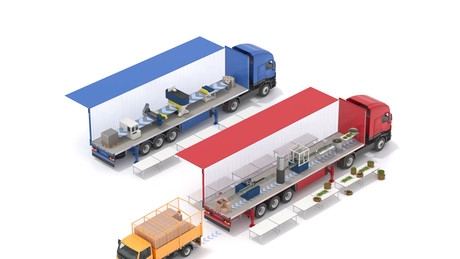Canning concept could cut food loss

Food loss could be significantly reduced in the future following Tata Steel’s development of its mobile canning line concept.
Whether it’s through postharvest handling, processing or distribution, the United Nations Environment Programme claims that a third of all food production worldwide is lost or wasted before it reaches consumers. However, the mobile canning line concept aims to address this issue, as it would enable farmers to create a production line to make and fill cans on-site.
By processing produce immediately, this would eliminate the risk of spoiled food, which would not only reduce food loss, but also generate additional revenues.
Steven Dijkstra, Head of Marketing Packaging & Nordics at Tata Steel in Europe, explained the potential benefits the canning line could provide.
“In India, 44% of food harvested is lost before it reaches consumers through the postharvest stages, often because it simply cannot be packaged and preserved quickly enough,” he said. “Tata Steel’s mobile canning line will allow farmers, even in the remotest of rural areas, to preserve their harvest, producing canned foods, ready for distribution on-site. In India alone, we have the potential to save 84 million tonnes of food per year.”
Dijkstra also noted that using canned foods alone was another positive outcome: “Canned foods retain high quantities of nutrients and also have a longer shelf life than their non-canned counterparts, helping to decrease food loss and waste further still.”
The canning line and food processing facilities would be easily transportable as it would be housed in two trucks, allowing it to reach remote areas. Distribution trucks would also collect and deliver cans straight from the farm.
Since they are easy to produce and are durable, two-piece drawn and redrawn (DRD) cans made from Tata Steel’s Protact — a specialist laminated steel with a polymer coating — would be used. The Protact circular blanks would be fed directly into the canning line and once created, they would be taken to the filling truck for processing.
After sorting the fruit and vegetables to ensure optimal quality, they would then be washed, prepared, canned, seamed, sterilised, visually checked and labelled all in situ. The trucks would be loaded with the filled cans ready for distribution to consumers.
Tata Steel is already communicating with interested parties and hopes its mobile canning and processing line will be available in the next three years.
Call for comment on infant formula products
FSANZ is calling for comment on an application to permit a new GM source organism for the...
GNT Ventures seeks startups to shape food colour innovations
Plant-based food colour supplier EXBERRY has launched an independent investment firm which will...
Fermenting future food sources for Australia
Forming a National Food Plan and appointing a food minister are among the key recommendations of...














